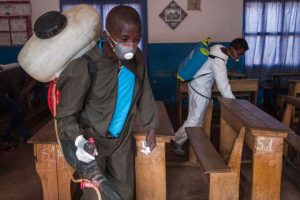 The pneumonic plague, a relative of the more well-known bubonic plague or the Black Plague, but not the same thing, is bacterial and spread from person to person through droplets in the air.
The pneumonic plague, a relative of the more well-known bubonic plague or the Black Plague, but not the same thing, is bacterial and spread from person to person through droplets in the air.
It can cause death as quickly as 24 hours if not treated. Over the last few months, there have been more than 1,900 suspected, not all confirmed, cases in Madagascar including 143 deaths.
However, the pneumonic plague is preventable as well as curable if it is treated early, according to data at the World Health Organization. The medication in Madagascar is free, yet many residents will not seek help.
Another reason people are not seeking help is the concern about what takes place with their body if they were to die from the bacterial disease.
Funerals for Malagasy are very important, as burying the dead takes place together with a host of rites. Amongst many of the Malagasy is the custom famadihana, when bodies are removed periodically from family crypts. Loved ones then clean the remains and re-shroud the bodies inside new cloth.
Once the bodies of loved ones are re-adorned, the Malagasy will dance with the dead near the crypt.
However, in Madagascar culture and science have collided and with devastating consequence, as the Malagasy are no longer able to perform the sacred rite if one of their loved ones died due to the plague.
The head of the health ministry said that if anyone dies due to pneumonic plague and then is interred inside a tomb that is opened in the future, bacteria can still transmit and contaminate whoever was handling the body.
Outbreaks of the plague are not unusual in the country, but in 2017 it has hit the capital with force not seen for many years. Health officials said 194 wards in the city are known to have infected people.
Controlling an urban outbreak is difficult in itself, but the worry over what to do with those who die makes the situation even more difficult.
The problem is at this time most family do not want to give back the loved one who died.
